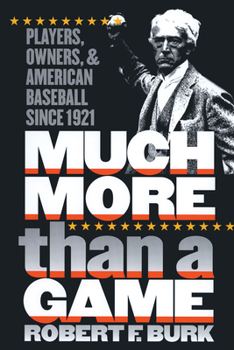Much More Than a Game: Players, Owners, and American Baseball since 1921
(Book #2 in the Players, Owners, and American Baseball Series)
Select Format
Select Condition 
Book Overview
To most Americans, baseball is just a sport; but to those who own baseball teams--and those who play on them--our national pastime is much more than a game. In this book, Robert Burk traces the turbulent labor history of American baseball since 1921. His comprehensive, readable account details the many battles between owners and players that irrevocably altered the business of baseball.
During what Burk calls baseball's "paternalistic era," from 1921 to the early 1960s, the sport's management rigidly maintained a system of racial segregation, established a network of southern-based farm teams that served as a captive source of cheap replacement labor, and crushed any attempts by players to create collective bargaining institutions. In the 1960s, however, the paternal order crumbled, eroded in part by the civil rights movement and the competition of television. As a consequence, in the "inflationary era" that followed, both players and umpires established effective unions that successfully pressed for higher pay, pensions, and greater occupational mobility--and then fought increasingly bitter struggles to hold on to these hard-won gains.
During what Burk calls baseball's "paternalistic era," from 1921 to the early 1960s, the sport's management rigidly maintained a system of racial segregation, established a network of southern-based farm teams that served as a captive source of cheap replacement labor, and crushed any attempts by players to create collective bargaining institutions. In the 1960s, however, the paternal order crumbled, eroded in part by the civil rights movement and the competition of television. As a consequence, in the "inflationary era" that followed, both players and umpires established effective unions that successfully pressed for higher pay, pensions, and greater occupational mobility--and then fought increasingly bitter struggles to hold on to these hard-won gains.
Format:Paperback
Language:English
ISBN:0807849081
ISBN13:9780807849088
Release Date:March 2001
Publisher:University of North Carolina Press
Length:384 Pages
Weight:1.30 lbs.
Dimensions:0.9" x 6.1" x 9.2"
Customer Reviews
1 rating
A Fine Discussion of Labor Relations in Major League Baseball since the Roaring Twenties
Published by Thriftbooks.com User , 18 years ago
This is the second volume of a projected two-volume history of labor relations in Major League Baseball (MLB). It deals with the period since 1921 and focuses on the integration of the game beginning in 1947, the labor disputes of MLB in the 1960s and 1970s when a rejuvenated Major League Baseball Players Association (MLBPA) under Marvin Miller won a series of bitter contests with the owners that eventually led to "free agency." During this period profound changes took place in labor relations in MLB. Mining records of MLB at Cooperstown and at other repositories, Burk fashions an interesting and useful narrative of the evolution of labor relations. He divides his book into two major parts; the first is what he appropriately calls the "paternalistic era" between 1921 and the early 1970s and the second is an "inflationary era" in the post-free agency period since that time. Although he discusses earlier management/labor issues, the centerpiece of this book is its discussion of the transformation of the Major League Players Association from a moribund organization into an efficient and exceptionally effective union in the 1960s when Marvin Miller assumed the position of executive director. Perhaps no union leader has been more effective than Marvin Miller in changing the nature of owner/employee relations. When he took over the MLPBA in the middle part of the 1960s Miller brought a wealth of experience in union organizing to a completely new arena. The moribund organization he took over had been a defacto arm of MLB and had succeeded in aiding in the preservation of the status quo in the game that has reigned since the first part of the twentieth century. Miller immediately began to change that relationship. He worked with the players to achieve a succession of small victories ranging from the raising of minimum annual salary to modest changes in such thing as meal money to salary arbitration and finally free agency. The ending of the longstanding "reserve clause" in MLB was the MLBPA's penultimate achievement. This "reserve clause" had been established in the nineteenth century by MLB and stated that the club had the right to renew a player's contract following each season even without the player's authorization--effectively making the player's contract the property of the team that first acquired him for the rest of the player's career. While the contract and hence the player could be traded, a player could not unilaterally choose to play for another team even if he did not have a current signed contract. Robert Burk follows the efforts of a succession of players, as well as Miller, who challenged the "reserve clause." He includes an important discussion of Curt Flood, an all-star center fielder traded from the St. Louis Cardinals to the Philadelphia Phillies in 1969 who refused to accept this trade and filed a lawsuit that went all the way to the U.S. Supreme Court advocating for his right to tender his services to other teams. He lost that





